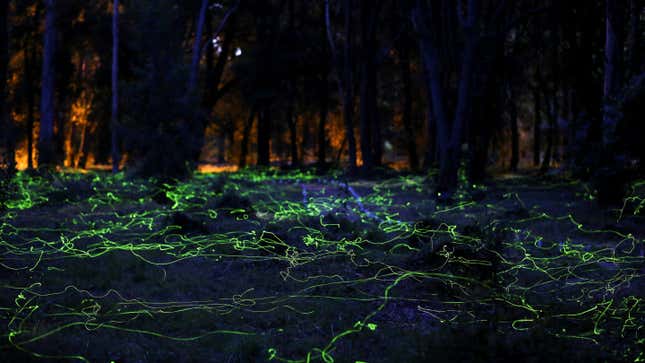Hi Quartz members!
What time of day do you enjoy your Sunday Reads? And what else would you like to see in this newsletter? Let us know.
5 things we especially liked this week on Quartz
👋 Goodbye to the god pod. “Goodbye to the Anigre wood paneling and staircases from Africa. Goodbye to the gleaming French floors, with limestone lifted from the likes of Lyon. …Goodbye to what one real estate developer tells the Dallas Business Journal is ‘the best corporate campus that no one’s ever seen.’” Gabriela Riccardi reports on ExxonMobil’s plan to scale down its executive digs, and the wider movement to redesign spaces for senior leadership teams.
🏞️ A rebalancing in Brazil. Petrobras, the Brazilian state-owned oil company, reportedly earmarked billions of dollars for oil exploration near the origin of the Amazon river. But the country’s top environmental regulator has spoiled the plan. Diego Lasarte examines a pivotal ruling and what it says about the shifting priorities of Brazilian president Luiz Inácio Lula da Silva.
🍿 Wither Bollywood? The big stars of India’s major film industry are no longer the reliable box-office winners they used to be, and the country’s biggest movie-theater operators are noticing. Niharika Sharma connects the dots between the just-announced closures of 50 PVR-INOX screens and the dimming popularity of Bollywood.
🧮 How to get kids to love math. Hannah Fry was 10 years old when she discovered the flywheel that helped her stick happily with a subject so many people loathe. In this Quartz video, the mathematician and popular UK television presenter advises parents and teachers on how to create “positive spirals” and avoid the traps that hold students back.
💪 Serbia’s definitive response to gun violence. After the US and Yemen, Serbia has one of the world’s highest ratios of firearms to residents. Yet lobbying in Belgrade after two mass shootings in Serbia this month quickly led to new gun regulations. Clarisa Diaz charts out the data, which practically asks its own question: Why is the US taking so long to figure out gun control?
Reads for your ears
It’s 2023, in case you hadn’t heard, and among all the things it feels like we really should have figured out by now, two stand out to us:
🧴Single-use plastic: It’s often the consumer’s duty to figure out what to do with a plastic product, but what could manufacturers do—and what should they be told to do—to make a real dent in the problem?
🗳️ Online voting: Casting a ballot from one’s own device would theoretically increase participation, but it’s a lot more complicated than it sounds. Will we get there in our lifetimes?
Listen to the latest two episodes of the Quartz Obsession podcast—out now!
✅ Subscribe wherever you get your podcasts: Apple Podcasts | Spotify | Google | Stitcher | YouTube
5 great stories from elsewhere

💰Money moves. The biggest transfer of wealth in US history is taking place. Over the next decade, an estimated $16 trillion will be passed down from baby boomers to Gen X and millennials. But as the New York Times explains, it’s not going to solve issues of economic inequality.
🌿 Leafy nemesis. Japanese knotweed, an invasive plant species in the UK, is a menace. Quartz’s Samanth Subramanian writes in the Guardian about knotweed’s tenacious ability to grow (not unlike kudzu) and the fierce battle by UK homeowners and landscapers to eradicate it.
👹 From the lagoon. The monster from the cult classic Creature From the Black Lagoon is a pop culture icon. But not many know about Ricou Browning, the man behind the mask. The Baffler dives into the career of the Florida native who went on to work as a director and screenwriter, but never left his watery roots behind.
💡 Glow hunter. Fireflies, also known as lightning bugs, are not actually flies. Nor are they bugs. The luminous insects are actually classified as beetles, and are among several living things on Earth able to glow, thanks to a compound called luciferin. Smithsonian goes on a fascinating glow-quest with ornithologist Christopher Heckscher.
🕵️♂️ Conan, fooled. Before Sir Arthur Conan Doyle penned the Sherlock Holmes novels, he was duped by school kids into thinking that fairies exist. If you’re not convinced that story is true, LitHub lays out the entire tricksome tale. Katie Spalding, author of Edison’s Ghosts, explains that though Mr. Holmes was a rational genius, his creator Dr. Doyle was anything but.
Surprising discoveries
Each weekday in our Daily Brief newsletter, we share five surprising discoveries, taken from all over. In case you missed them, we’re showcasing our top five favorites from the week. Check out this week’s picks, which include peanut allergy solutions, mosquito repellants, and asteroid relief.
What to watch for this week

These are some of the events our newsroom will be paying attention to in the week ahead.
- Monday: Rayyanah Barnawi becomes the first woman from Saudi Arabia to travel to the International Space Station. Earnings to watch include Ryaniar and Zoom.
- Tuesday: The winner of the International Booker Prize is announced, and the latest data on new home sales in the US gets released.
- Wednesday: Amazon shareholders meet for the e-commerce giant’s annual shareholder meeting.
- Thursday: Several US retailers report earnings, with Costco, Dollar Tree, Ulta, and Best Buy among them.
- Sunday: Voters head to the polls in Turkey’s runoff election
Thanks for reading! Here’s to the week ahead, and don’t hesitate to reach out with comments, questions, feedback, math tips, or movie monsters. Sunday Reads was brought to you by Susan Howson, Morgan Haefner, Heather Landy, and Julia Malleck.


